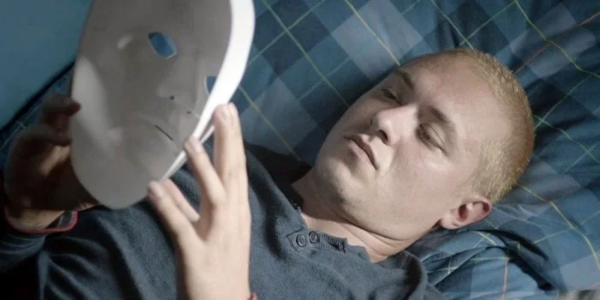
The Story:
In Tár, Cate Blanchette gives a riveting performance as Lydia Tár, a woman who rose to fame in the male dominated world of the philharmonic orchestra to become a world-renown conductor. While promoting her most recent book, Tár on Tár, and preparing for her upcoming live recording of Mahler’s Fifth Symphony, Lydia Tár’s world begins to unravel.
The film follows Lydia through her present-day life, starting with her being interviewed in front of an audience, where we learn of her rise to fame, that she’s a lesbian, and that she has started the Accordion Foundation to help aspiring female conductors fulfill their dream. We then see her having lunch with Eliot Kaplan (Mark Strong), an amateur conductor and manager of the Accordion Foundation, where they briefly discuss an Accordion fellow, Krista, who Eliot says is trouble and Lydia describes as having issues. We later see her teaching a class at Juilliard, where, after a student confronts her on the white male privilege and misogyny of composers such as Bach, she tells the students to focus on a composer’s work and not their personal lives. And not long after that, Lydia’s assistant, Francesca (Noémie Merlant), tells her about another desperate email that had been sent from Krista and asks how she should respond. And that is when it becomes obvious that there is trouble in paradise.
From here Lydia Tár’s tightly controlled life slowly begins to unravel. At first, she continues living her life as normal, flirting with women, meeting with friends and colleagues, and hiring a new cellist; and because of Lydia’s achievements, position, and the lack of possibilities for women to advance past the orchestra, Lydia is able to reap the benefits of fame and quietly controlled power.
Despite the nature of the story, the director, Todd Field, handles the subject with dignity and elegance. It never becomes tawdry or vulgar, instead taking the high road and focusing on character and substance. Lydia Tár is depicted as a woman with drive, a hard edge, and a tender spot for people she admires. We see how the exposure of Lydia’s personal life, and how she tries to privately control the situation, affects her marriage to Sharon, who is a concertmaster. It isn’t until the events spill out of Lydia’s control that Sharon (Nina Hoss) finds out and confronts Lydia, asking why she hadn’t come to her to discuss it. It’s a difficult scene that exposes the complexities of their relationship.
Unlike most LGBT films, Tár doesn’t focus on Lydia’s sexuality, opting to define her as a woman who happens to be a lesbian. Lydia’s drive and focus on her professional life takes center stage. When she tells her students to judge a composer by their work and not by their personal life, she is also asking to be treated the same. For Lydia Tár defines herself by her work and nothing more. And although Tár is a film about the abuse of power, it’s also about a woman whose identity is so deeply rooted in her work that all she can do when it’s taken away is start from the beginning.
Final Thoughts:
With Tár, Todd Field gives us a film that succeeds on every level. It’s subtle, well shot and edited, has some great performances, and a thoughtful script that understands how people interact. Every aspect of this film works so well that I never felt it’s length, which is two hours and thirty-eight minutes. It is a film that should not be missed.




One response to “Movie Review: Tár”
[…] Read my review of Tár here. […]